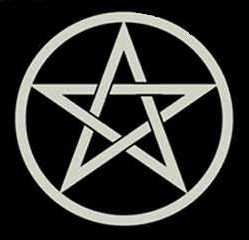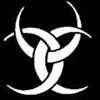| |
Myths About Witchcraft
Myth #1: Wicca is Satanism
- Status of Myth: Untrue
- Basis of Myth: The concept that Wicca is Satanism comes from a misunderstanding of the Wiccan paradigm.
Wicca neither promotes or reveres the Gods of Judeo-Christianity, including the Judeo-Christian "god" of evil, who some Christians call "Satan."
In some Christian sects, anything that is not Christian is "of Satan," this includes secular thought, technology, scholarship, medicine, and yes, even Wicca.
The same people that fight technology, the sharing of information and the like are often against Wicca.
This is not a fault of their religion, but of their upbringing.
Some of the people that confuse Wicca with Satanism are confused by things that Wiccans think are really clear, but to those outside the faith, these things are frightening.
People are often afraid of what they don't understand, and in some religions, the name of their fear is "Satan."
A basic study of the Wiccan faith would easily expose the flaw in equating it with Satanism, but many of those promoting this myth are afraid that to study Wicca would drag them into some dark, secret cult.
Worse still, those Christians that have studied Wicca and find it to be non-Satanic in origin are ignored, accused of being "deceived" into promoting what we know to be fact.
Personal experience has shown that the best way to dispel this myth is to be warm, open and forgiving to it's promoters.
Those few Wiccans that fight such people with harsh words and anger merely further their delusions.
Fight them, if you must, with love and understanding.
A Wiccan follower of Apollo once said that "Truth is like a red hot cinder, if it touches the brain it works its way in, and won't stop until it's reached the center."
Myth #2: Wicca is a cult
- Status of Myth: Mostly False
- Basis of Myth: Like mentioned in Myth #1, some people equate things that are not of their religion as
that which they see as bad. For some people, the "bad" is called "Satanism", for others, the bad is called "cult."
Wicca is not a cult in popular terminology. When the definition of cult used is that cults are destructive,
centered on a charismatic leader, or restrictive of it's members movements, then Wicca clearly is not a cult.
However, to those that define cult as merely a small group of dedicants to a particular faith or god, there are
many "cults," the use of the previous definition, however, causes us to use the word "sect" instead of cult, for such groups.
There are, sadly, some groups within the world that lay claim to the name "Wicca" and clearly neither follow nor
really understand Wicca. To use such few and far between groups as the definition of Wicca is as ignorant as to use
the Branch Dravidians or the Jonestown folk as the definition of Christianity.
Put simply, Wicca that uses the moral guidelines that most Wiccans use to define their religion is not a cult.
Myth #3: Wicca is Goddess Worship
- Status of Myth: Exactly One half true/One half false.
- Basis of Myth: Modern Wicca in it's earliest incarnations points to a God and Goddess in divine unity. In many of Modern Wicca's books, The Goddess is stressed only because it is assumed that the reader has a pretty good grasp of the concept of male deity. Wicca (specifically) believes that deity, whether divine as interpreted by the ancient world, or modern concepts of deity, is either without gender, beyond gender, or reflective of the human race and having both genders. Most of these concepts can be simplified to mean "Lord and Lady." If Lord and Lady is not an ideal term, it is at least preferably to "lord" or "lady" in such cases.
Dianic Wicca, in almost all it's forms, stresses a feminine divinity but does not deny the concept of male deity. Belief that is similar to Dianic Wicca, but denies the concept of any male deity at all, is usually referred to as "Dianic Paganism" and has little to do with modern Wicca. Dianic Pagans who are not Wiccan, as well as the followers of a number of indigenous religions can be described as being goddess worshippers, but are NOT Wiccan at all. Likewise, many Wiccans, followers of the Lord and Lady, can be described as "Goddess Worshippers" but that isn't the whole of their faith.
This myth is based on reading a few small books on Dianic Paganism and making the assumptions that:
- Dianic Paganism and Wicca are always the same thing.(untrue)
- Books about the Goddess that don't mention the God mean no God exists.(untrue)
- Goddess Worshipers and Wiccans are one and the same. (partially true)
Myth #4: Wiccans rebuke Christ
- Status of Myth: Not even slightly true.
- Basis of Myth: This myth has two foundations. One is the assumption that the Witches defined by the inquisition are
modern Wiccans (untrue). The Second, and more prevalent belief, is that Wiccans recruit or otherwise convert "good
Christians" to Wicca, and that as part of that conversion they have to leave their old religion behind.(also untrue)
This myth is proven untrue by the fact that there are Wiccan Christians. There is no ritual in any form of Wicca that requires a renouncing or rebuking of a faith, a previous held one or otherwise. I state this as a researcher of Wicca and a lifetime participant in many different traditions and a degree holder of the highest honor in many of them.
Myth #5: If Wiccans do magick, why don't they...
- Status of Myth: A simple misunderstanding of terminology
- Basis of Myth: Many Wiccan web sites and literature explain "healing" and the like. As mentioned in Myth #1,
to those that are not familiar with Wicca, the ability to heal and such seems like a big lie and all. I mean,
if we can heal people, we should all be working hospitals, right? Well, first off, you don't heal a cut with
a computer, you don't write a paper with a cutting board and a carving knife, and you don't use the tools of
the spirit to heal the body. You use the tools of the spirit to heal the spirit. Now, science has proven,
through observational and descriptive research, that those who are at peace spiritually, heal physically faster.
Wiccans believe that we must heal with the gifts the Gods gave us, prayer, medicine, knowledge, the sharing of
information, science, our minds. Many Wiccans do work in hospitals, healing people with their gifts. They usually
use the title "doctor" or "nurse" in such settings, though, not "priest" and "priestess".
Myth #6: Wicca is a weak and flawed form of Magick
- Status of Myth: Untrue
- Basis of Myth: To some metaphysicians, the fact that some Wiccans do magick means that Wicca is a magickal form.
Wicca isn't any form of magick. Some Wiccans use Kabala, some use other ceremonial magick, some use astrology, some
use tarot, but none of those things are "Wiccan." The only "magick" that can be perceived as intrinsic to Wiccan faith
is the practice of ritual, and, for the most part, that is no more a metaphysical system than any other form of
celebration/prayer. Some Wiccans don't even believe in Magick as a metaphysical system. Now, admittedly, using
Crowley's hypothesis that every intentional act is a magickal act, then the intentional actions of worship are
inherently magickal, but the act of ceremonial magick as perceived by those that foster said myth has little, if
anything, to do with the Wiccan practice of worship/ritual. Astrology, tarot, Magick and the like are often
assumed to be Wiccan in nature because some Wiccans do them. Statistically, I bet a lot of fishermen are Christian.
I fish, and I'm not, so clearly, fishing (for fish) is no more the definition of Christianity than Magick is the
definition for Wicca.
|


